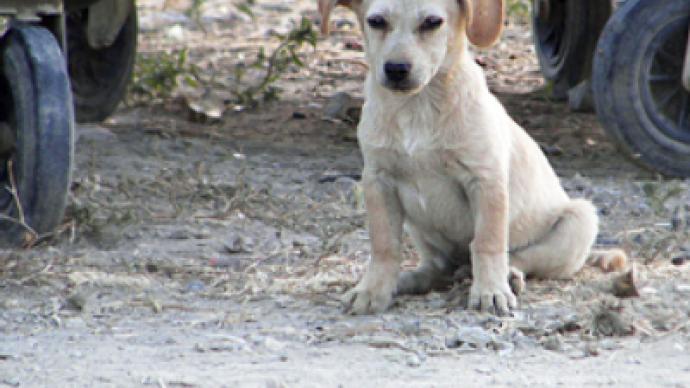Brits dump pets in desperation

The number of unwanted pets abandoned and left to starve has lately soared in Spain. But despite the UK’s reputation of being a nation of animal lovers, British expats returning home are the main culprits of pet dumping.
There may be a shortage of rain in Spain this year, but it looks like it has been raining something other than water – cats and dogs to be precise – as, according to an annual report by the pet welfare organization, Affinity Foundation, the number of pets now abandoned in the country is as many as 17 every hour. It is rarely possible to walk through a Spanish village without seeing pets that have been discarded by their owners, limply slouching from one bin to the next, scrounging around for scraps of food, barely able to survive in the relentless heat.
Spain has the largest number of abandoned animals in Western Europe, and Affinity Foundation’s report has disclosed that Spanish animal rescue centers and town hall pounds took in almost 39,000 abandoned cats and 118,000 deserted dogs last year. Experts assert that more pets are dumped in the summer months because of changes in animal behavior with the onset of hot weather, and because the start of summer marks the end of the hunting season. But perhaps the biggest surprise behind Spain’s growing sea of strays is the suggestion made by workers from animal rescue centers. The significant number of dogs and cats that have been rescued from deserted properties belonging to Brits, and in places with large British enclaves, have led animal welfare workers to proclaim that a proportion of Britons packing up are not only kissing goodbye to their life in the sun, but their pets as well.
The wellbeing of animals has never been a priority in Spain. The number of stray dogs and cats littering the towns and countryside, and roadsides lined with so many bludgeoned beasts that it looks like a butchers van has been down the road with the doors open, is testimony that animal neglect is rife. Unlike countries like the UK, Spain does not have a charity equivalent to the RSPCA that is dedicated to the wellbeing of animals. What makes the idea that it is the British people leaving Spain that are the main advocators of the escalating cruelty seem so absurd, is because for years, hordes of expatriates from the UK have taken animal neglect upon themselves and transformed their homes into refuges for animals. Whilst many dog lovers may have relocated with just their two pet Rovers in tow, after taking many a sorrowful stray under their wing, this number has often quickly grown to a dozen. Joanna, who posted details about her own situation on a blog site dedicated to expatriates living in Spain, wrote:
“I came to Spain in 2004 with two mutts from England….I now have nine, plus one more living with my daughter. Each time we say “no more”! What shocked me at first is that lots of these dogs are not your typical “stray mutt” – I have a Beagle, a Golden Retriever, a Lab, a Boxer and St Bernard amongst my crew.”
Pedigree pets that do not conform to the “flea-ridden and matted fur” stray cliché are still bearing the brunt of their owners’ unease, those who are “bailing out” of Spain and heading back to the UK. The few animal rescue centers existing in Spain are now overflowing, with the number of rescued animals doubling in the last year. Marie Stevens, kennel manager at an animal rescue center near Estepona said:
“It’s incredible. People find time to pack up their furniture and other belongings and yet their pets’ welfare is an afterthought.”
Three small dogs were recently rescued from a boarded-up villa near Estepona. This was several weeks after their owners had left and gone back to the UK because they could not keep up the repayments on the mortgage. Talking about the grim story, Marie Stevens said;
“It was an incredible act of cruelty. The dogs had been left some food and water, but if a neighbor hadn’t heard the barking and called us, they would have eventually started eating each other before starving to death.”
Despite the Spains notorious bureaucratic systems when dealing with anything “official”, it is mostly the British laws surrounding importing pets that seems to be motivating the dumping of pets. Quarantine laws in the UK make it extremely time-consuming and costly for expatriates to bring their pets back into Britain. All animals coming into the UK have to have a “pet passport” which proves they are free of rabies. Attaining a “pet passport” will cost the owner 1000 pounds in fees, and can take up to seven months, hence the decision simply to abandon them. Celia Lago, an administrator at an animal rescue centre in Marbella said:
“The Germans or Dutch just put their pets in the back of the car and off they go, but the Brits don’t have that option.”
One expatriate who has first-hand knowledge of the ambiguous rules and regulations surrounding the export and importation of animals, and who is “adversely understanding” of this unusual “British” behavior, is Dave Broome, a 56-year-old animal-lover and parrot-breeder who moved to Spain five years ago. Although Dave Broome has a soft spot for all animals, his choice of pets, fortunately, are not being routinely dumped by fleers. When Dave and his wife Jenny relocated to Spain from Devon, they drove there, like many emigrants do, with their worldly possessions, furniture, pots and pans, photo albums, record collection…oh and 28 parrots! Although it was not just the parrots onboard his transit van, as Dave needed to make five different trips back to England to bring out their aviaries and finally resettle with his lifelong passion.
Although Dave cannot understand the callousness of expats abandoning their pets in order to return to the UK, because of the bureaucracy surrounding importing and exporting animals to Spain, he can comprehend the motives for leaving animals behind. When asked about his thoughts about this “unconventional” British behavior, Dave Broome replied in a broad Devon accent:
“You would think that dumping your pet and leaving the country without it would only be performed by a person with a malicious streak, but I know how hard it was to bring my pets here, and I have heard it is even harder to take them back! I don’t think these “dog dumpers” are outright evil or anything, just financially desperate. And desperate times can often call for desperate measures. Not that I’m condoning it or anything. I would never leave any of my parrots to fend for themselves.”
Although dogs are not “really his thing”, Dave admits to feeling sorry for the family of strays who have resided under the municipal dustbins in his village. He said:
“The bitch is on her third litter. I regularly throw them some scraps. She should be less enthusiastic about getting pregnant though and take a leaf out of my parrots’ book. They’re really finicky about who they mate with.”
Whilst many British expatriates living in Spain are probably disgusted by the thought of dumping any living creature by the side of a road, as the pound shows little sign of rising against the euro and unemployment continues to rocket, some people, it seems, are left with little choice than briskly to bail out. Unfortunately, animals seem to be bearing the brunt of a lifestyle in the sun that has turned sour.
Gabrielle Pickard for RT













